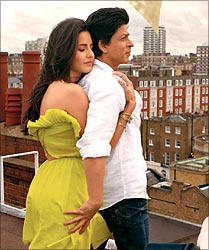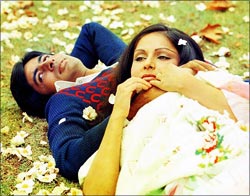 | « Back to article | Print this article |
 Yash Chopra definitely knew how to entertain, writes Aseem Chhabra.
Yash Chopra definitely knew how to entertain, writes Aseem Chhabra.
A Bollywood giant, father figure to many stars and a man who defined romance for generations has left us.
Yash Chopra's death is a personal loss to his family, friends and colleagues. But as India marks 100 years of its cinema, the nation has lost a man whose career spanned half a century of filmmaking.
He was the symbol of our popular culture, a man who played a substantial role in how Hindi language cinema has shaped out as a medium of entertainment. I do not say this lightly, but his death is truly the end of an era for Bollywood.
Twenty-two films over 53 years, Chopra started his career as a director with a Rajendra Kumar, Mala Sinha and Nanda film Dhool Ka Phool (1959). His final film Jab Tak Hai Jaan, stars two of the youngest faces of Bollywood -- Katrina Kaif and Anushka Sharma, along with Chopra's favourite superstar Shah Rukh Khan.
That is such a long journey, and a remarkable one too.
There were themes that Chopra explored often -- social dramas Trishul (1978) and Deewar (1975), reflecting the anger in the society in the 1970s, helped with tight dramatic scripts by Salim-Javed and the towering performances of Amitabh Bachchan, aided with Shashi Kapoor and Sanjeev Kumar.
Then, there was the romance of his adult characters, who made difficult, sometimes wrong choices in films like Daag (1973), Kabhi Kabhie (1976), Silsala (1981), Veer-Zaara (2004), and the candy floss entertainer Dil To Pagal Hai (1997), where Karisma Kapoor's and Madhuri Dixit's characters competed for the love of a choreographer played by SRK.
And then, there were his early works which became trail blazers of Hindi cinema -- the song-less thriller Ittefaq (1969), the first multi-star drama, Waqt (1965), and Dharamputra (1961), the rare popular film that explored Hindi-Muslim unity in post-independence India.
Other than perhaps in Dhool Ka Phool and Dharamputra, Chopra never showed interests in becoming a social realist like Raj Kapoor, whose early works found a healthy balance between social commentary and musical entertainment.
Chopra never set out to change the world but he definitely knew how to entertain. His legacy remains in taking us into the magical realm of popular cinema, where dreams, romance and heartache played on beautiful locations (often the scenic Europe), where beautiful actresses (Sridevi, Madhuri Dixit, Rekha) wore chiffon saris and ran around rolling hills or in the middle of fields of tulips, lip syncing to Lata Mangeshkar's voice, along with the good looking popular male stars of the time. More than anything else, it was the songs that defined Chopra's films. I interviewed him 10 years ago on the occasion of his 70th birthday and he mentioned that the title song from Kabhi Kabhie might have been his all-time favourite.
More than anything else, it was the songs that defined Chopra's films. I interviewed him 10 years ago on the occasion of his 70th birthday and he mentioned that the title song from Kabhi Kabhie might have been his all-time favourite.
'There are two versions of the song,' he had said. 'It was originally written for a book recital but it came off very well as a thought. It was a new concept and the song has become immortal.'